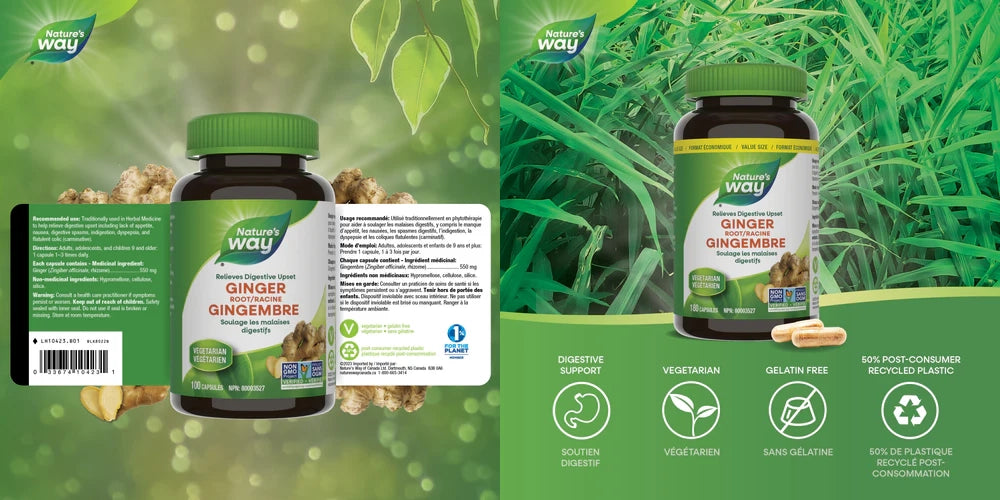
NATURE'S WAY Ginger Root (100 caps)
Share
Ginger Root Supplements: Benefits, Uses, and Key Considerations
Ginger root, derived from the plant Zingiber officinale, has been a cornerstone in traditional medicine and culinary arts for centuries. Its rich array of bioactive compounds, notably gingerol and shogaol, contribute to its extensive health benefits.
Digestive Health
Ginger is renowned for its efficacy in alleviating various digestive issues:
-
Nausea Reduction: Studies indicate that ginger can effectively reduce nausea associated with pregnancy, chemotherapy, and motion sickness. For instance, consuming 1 gram of ginger daily has been shown to alleviate pregnancy-related nausea.
-
Indigestion and Bloating: Ginger may enhance gastrointestinal motility, aiding in the relief of bloating and discomfort. A single dose of 1.2 grams of ginger root powder taken before meals has been found to expedite gastric emptying in individuals with dyspepsia.
Anti-Inflammatory and Pain Relief
The anti-inflammatory properties of ginger are attributed to its ability to inhibit pro-inflammatory pathways:
-
Arthritis Relief: Regular intake of ginger supplements has been linked to reductions in pain and improvements in joint function among osteoarthritis patients. Doses ranging from 500 mg to 1 gram taken two to four times daily have demonstrated efficacy.
-
Muscle Soreness: Ginger's anti-inflammatory effects may also reduce exercise-induced muscle soreness. Consuming 2 grams of ginger daily for 11 days has been associated with significant reductions in muscle pain following exercise.
Immune Support
Rich in antioxidants, ginger supports the immune system by combating oxidative stress:
- Antioxidant Properties: The bioactive compounds in ginger help neutralize free radicals, potentially reducing the risk of chronic diseases. Incorporating ginger into the diet can enhance overall antioxidant defenses.
Blood Sugar Regulation and Heart Health
Emerging research suggests ginger's potential in metabolic and cardiovascular health:
-
Blood Sugar Control: Some studies have observed that ginger supplementation can lead to modest reductions in fasting blood sugar levels, indicating potential benefits for individuals with type 2 diabetes. However, more extensive research is needed to confirm these effects.
-
Cholesterol Levels: Ginger may aid in lowering LDL cholesterol and triglyceride levels, contributing to improved heart health. A study reported that taking 1 gram of ginger three times daily for 45 days resulted in significant reductions in triglyceride and cholesterol levels.
Who May Benefit from Ginger Supplements
-
Individuals Experiencing Nausea: Those dealing with morning sickness, motion sickness, or chemotherapy-induced nausea may find relief with ginger supplementation. Consulting a healthcare provider for appropriate dosing is recommended.
-
Arthritis Sufferers: Individuals with osteoarthritis or rheumatoid arthritis may experience reduced pain and improved joint function with regular ginger intake. Typical doses range from 500 mg to 1 gram taken two to four times daily.
-
Athletes and Active Individuals: Ginger's potential to reduce muscle soreness can benefit those engaging in regular physical activity. A daily intake of 2 grams for a period of 11 days has been associated with decreased muscle pain.
Dosage and Usage Considerations
-
General Dosage: Daily intake typically ranges from 250 mg to 2 grams, divided into multiple doses. The U.S. Food and Drug Administration (FDA) considers ginger to be generally safe, with an approved daily intake recommendation of up to 4 grams.
-
Duration of Use: For acute conditions like nausea, short-term use over several days is common. Chronic conditions, such as arthritis, may warrant longer-term use under medical supervision.
-
Potential Side Effects: While generally well-tolerated, some individuals may experience mild side effects, including heartburn, diarrhea, or stomach discomfort, especially at higher doses. Taking ginger with meals can help mitigate these effects.
Precautions
-
Pregnancy: Pregnant individuals should consult a healthcare provider before using ginger supplements, as it might increase the risk of bleeding, particularly close to the delivery date. However, it appears to be safe for morning sickness without harm to the baby.
-
Blood Disorders: Individuals on blood thinners or those with bleeding disorders should exercise caution, as ginger may increase bleeding risk. Consulting a healthcare provider before use is advisable.
-
Gallstones: Those with gallstones should seek medical advice before incorporating ginger supplements into their regimen.
In conclusion, ginger root supplements offer a multitude of health benefits, from aiding digestion to providing anti-inflammatory and antioxidant effects. As with any supplement, it's essential to use ginger responsibly and consult with a healthcare professional to ensure it aligns with your health needs and conditions.
